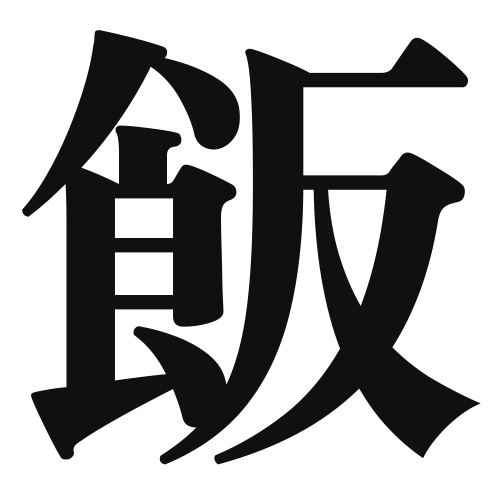1. Overview of Meaning
The kanji “飯” (pronounced “meshi” or “han”) primarily means “rice” or “meal” in Japanese. It refers to cooked rice, which is a staple food in Japan, and can also denote a meal in general.
2. Formation and Radical
Formation of the Kanji: The kanji “飯” is a compound character that combines the radical for “food” (食) and the character “反” (han), which originally referred to the act of cooking or preparing food. This character is categorized as a phonetic-ideographic character because it conveys both meaning and sound.
Radical: The radical of “飯” is 食 (shoku), which relates to food and eating.
3. Examples of Usage
Common Words and Phrases: Some common words that include “飯” are:
- ご飯 (gohan) – cooked rice or meal
- 飯屋 (meshiya) – a place to eat, like a restaurant
Example Sentences in Daily Conversation:
- 今晩、何を食べる?ご飯はどう? (Konban, nani o taberu? Gohan wa dou?) – What are you eating tonight? How about rice?
- 彼は毎日ご飯を作ります。 (Kare wa mainichi gohan o tsukurimasu.) – He cooks rice every day.
4. Synonyms and Antonyms
Similar Kanji: A similar kanji is “食” (shoku), which means “to eat” or “food.” While “飯” specifically refers to rice or meals, “食” encompasses a broader range of food-related meanings.
Opposite Kanji: An antonym could be “飢” (ki), which means “hunger” or “starvation,” representing the absence of food.
5. Cultural and Historical Background
Relation to Japanese Culture: Rice is a fundamental part of Japanese cuisine and culture, symbolizing sustenance and prosperity. It is often featured in traditional ceremonies and festivals.
Proverbs and Idioms: One common saying is “飯が食えない” (meshi ga kuenai), which means “to be unable to make a living,” highlighting the importance of food in daily life.
